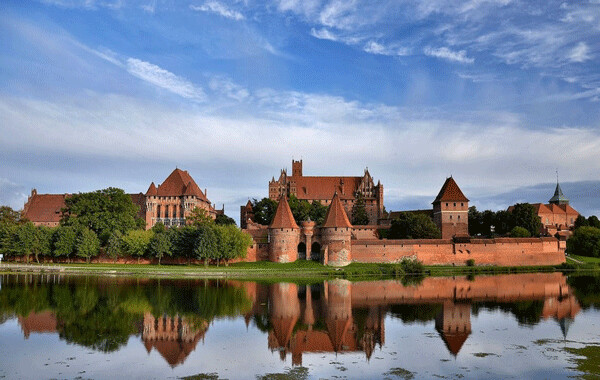So Many Sides of History

Before long I’ll be in Europe for a while. There are many things I hope to see and get some feel for. What impression will I get from Malbork, the Red Castle? A World Heritage site, the Red Castle was the onetime seat of Teutonic power on the southern Baltic shore. What will prove most telling? Will it be the ramparts themselves or what those towering defenses hoped to protect? We often hear “fur trade” used as a “has been” of little importance to today But a cursory dismissal of fur trade importance to the present makes little and gets less from that reduction. The fur trade dealt in goods and resources coming from all around the globe, and so did the Red Castle in overseeing and profiting by trade spanning an equal portion of geography. And indeed, many of the same things of importance to the fur trade were crucial along the Baltic shore. With the Red Castle defending trade and traders, resources, material, goods, information and cultural exchange was likewise protected. The North American fur trade was no more limited in scope and importance to animal skins than the Baltic trade stopped at amber of wood. Much, much more than that took place.
Fur, oils for light and cooking, timber, metals, grain, and of course amber were profitable trade items that helped feed people up and down the trade routes. Trade was a necessity. An area that produced an abundant supply of splendid spruce wood would gain in return fabric and grain for a better more comfortable life. And same as North American trade routes existed well before the arrival of Europeans routes were in use well before the Teutonic Knights set about establishing their sphere of influence. It is not difficult to figure out that trade benefited many parties, and it is not hard to see that as you began to live a more secure life you’d be better off part of a defensible system. Fur trade posts were sometimes forts as well. Clearly Malbork was a depot in addition its defensive role. The purpose of each is roughly the same. It’s good to be reminded that trade had a role and flourished well before anyone categorized the activity as capitalistic.
My readers know how easily I veer off on tangents. This about history is sparked by my trip, but also by a recent reminder when driving through Hoyt Lakes. The street names speak of English places; Dorchester, Leeds, Coventry, and others. I knew that and knew also of the connection being made with miners from Cornwall in England having prominent places in the early days of iron mining in America. It’s undeniably correct many other places saw mining and metallurgy. The terminology Damascus for a certain type of steel work is a clear indicator something was going on there that had to involve more than that single place in order for the product to be made in any volume worth noting. I see the historic past as a wide weaving of multiple strands so large it’s difficult to impossible to view all of it in a single capsule. The powers planning Hoyt Lakes used English place names in recognition what they knew best. It doesn’t mean doing so denied the long successes of other mining peoples. Salt and Coal mining were vitally important to many peoples and nations. This was sometimes conducted in difficult underground mines going back hundreds of years before the rise of Iron Range mining. There are many very ancient mines on the planet and it’s simple as this. If you visit an ancient sale mine such as Wielczka you will not find (and rightly so) any focus on or mention of salt mining going on today under our Great Lakes. These are different things not fitting under the same umbrella. When people object to names and histories as being limited and biased I agree, but what’s the cure? That I can see there is no (and I suspect gratefully so) universal code of coverage saying this name is correct and others are suspect or hateful. If street names change to Elm and Oak, etc. there is still bias for certain trees over others and atop that a bias for plant names instead of animals. Is it better if Mulberry becomes Fox? If it does would that satisfy or would it lead to Fox having to become Ion or Purity or Christine?
There is, I find, a common element running under complaints about the way history or other things are handled publicly. That element is subjectivity. If my subjective view is the one to be served I’m sorry to say there won’t be much left standing. Not having an English heritage I can say “to hell” with giving special recognition to any part of that. Plus, as an illegitimate product of WWII I can say “push off” to darn near anything my subjective self chooses to dismiss. Now I could use an objection as a jumping off place to add information and discuss its interpretation, but won’t much of the result depend on how I approach that aim? If there are stories I can tell of mining and commerce and trade than I should tell them. But if instead I start by telling others who biased and wrong they are I make the job of informing all the more difficult. In history we try to get at a factual record knowing it won’t be total or without flaw. When we attempt to correct the record with our views about its meaning it is then called politics. Political views tend to favor the subjective, and I know people will rightly correct me saying no one is able to be truly objective. OK, but I won’t stop trying. I won’t let the subjective take rule without putting up a darn good fight.
